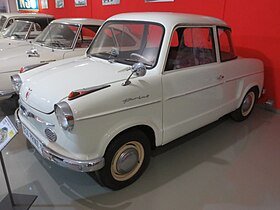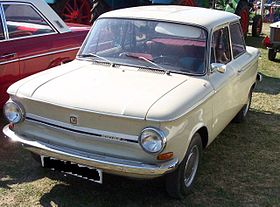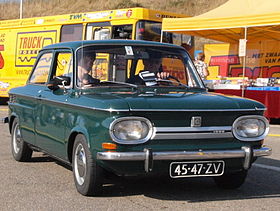NSU Sport Prinz
| NSU Prinz I, II & III | |
|---|---|

NSU Prinz I
|
|
| Overview | |
| Production | 1958–1962 |
| Assembly |
Neckarsulm, West Germany Arica, Chile Heidelberg, Australia |
| Body and chassis | |
| Body style |
|
| Related |
|
| Powertrain | |
| Engine | 583 cc (35.6 cu in) I2 rear-mounted air-cooled |
| Transmission | 4-speed manual 4-speed manual all-synchromesh |
| Dimensions | |
| Length | 124 in (3,150 mm) |
| Width | 56 in (1,422 mm) |
| Height | 53 in (1,346 mm) |
| NSU Sport Prinz | |
|---|---|

1964 NSU Sport Prinz
|
|
| Overview | |
| Production | 1958 to 1968 20,831 produced |
| Assembly |
Neckarsulm, West Germany Turin, Italy (Bertone) |
| Body and chassis | |
| Body style | 2-door coupe |
| Related | NSU Spider |
| Powertrain | |
| Engine | 583 cc I2 598 cc I2 |
| NSU Prinz 4 | |
|---|---|
 |
|
| Overview | |
| Also called |
Ramses II (ET) NSU P-1000 (URU, 1963-1964) |
| Production | 1961-1973 |
| Body and chassis | |
| Body style | 2-door saloon |
| Related | NSU P6 (Uruguay, 1963-1967) |
| Powertrain | |
| Engine | 598 cc air-cooled OHV I2 |
| Transmission | 4-speed manual all-synchromesh |
| Dimensions | |
| Wheelbase | 2,040 mm (80 in) |
| Length | 3,440 mm (135 in) |
| Width | 1,490 mm (59 in) |
| Height | 1,360 mm (54 in) |
| NSU Prinz 1000/1000 C/TT/TTS | |
|---|---|

NSU 1000 C
|
|
| Overview | |
| Production | 1963-1972 |
| Body and chassis | |
| Body style | 2-door saloon |
| Related | NSU P10 (Uruguay, 1970-1971) |
| Powertrain | |
| Engine | |
| Transmission | 4-speed manual all-synchromesh |
| Dimensions | |
| Wheelbase | 2,250 mm (89 in) |
| Length |
|
| Width | 1,490 mm (59 in) |
| Height | 1,364 mm (53.7 in) |
| Chronology | |
| Successor | Audi 50 |
The NSU Prinz (Prince) is an automobile which was produced in West Germany by the NSU Motorenwerke AG from 1958 to 1973.
The first post-war NSU car, the Prinz I, was launched at the Frankfurt Motor Show in September 1957 accompanied by the advertising slogan "Fahre Prinz und Du bist König" ("Drive a Prince and you're a king"). After a pilot run of 150 preproduction cars, volume production began in March 1958.
The Prinz I was available as a 2-door saloon featuring an upright roof line and seating for four people. The doors opened wide enough to permit reasonable access even to the rear seats, although leg room was severely restricted if attempting to accommodate four full sized adults. In addition to a luggage compartment accessed via a hatch at the front of the car and shared with the spare wheel and fuel filler, there was a narrow but deep full width space behind the rear seat sufficient to accommodate a holiday suitcase.
The noisy two-cylinder 600 cc 20 PS (15 kW; 20 hp) engine was located at the back where it drove the rear wheels, initially via a "crash" gearbox. Later versions gained a four-speed all-synchromesh gearbox. Contemporaries were impressed by the brevity of the maintenance schedule, with the engine, gear box and final drive operating as a single chamber and all lubricated by means of oil, added through a filler in the rocker box cover. There were just two grease nipples requiring attention, positioned on the steering kingpins. The engine was also commended in contemporary reports for its fuel economy and longevity. Although noisy, the engine offered impressive flexibility, recalling NSU's strengths as a motorcycle manufacturer.
The Prinz II (a 'luxury' version) was released in 1959 with better trim and an all-synchromesh gearbox. A 30E export version was equipped with a 30 hp engine. The Prinz III was launched in October 1960 featuring a new stabilizer bar and the 30 hp motor.
NSU received government approval to build the Prinz in Brazil in the late 1950s, but nothing came of the project.
NSU Prinz II
NSU Prinz 30E
NSU Prinz III of 1961
The Sport Prinz was a 2-seater sports coupe variant. It was designed by Franco Scaglione at Bertone studios in Turin. 20,831 were manufactured between 1958 and 1968. The first 250 bodies were built by Bertone in Turin. The rest were built in Neckarsulm at a company called Drautz which was later bought by NSU.
...
Wikipedia
